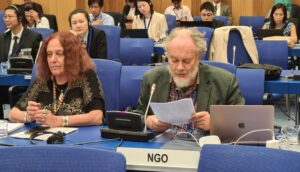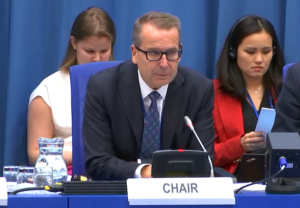Report by Alyn Ware*
In a video meeting held on Monday June 28, Chinese President Xi Jinping and Russian President Vladimir Putin extended the China/Russia Treaty of Good-Neighborliness and Friendly Cooperation, and reaffirmed a mutual commitment in the Treaty not to use nuclear weapons first against each other, nor to target each other’s strategic nuclear missiles. See Russia, China Pledge to Not Use Nuclear Weapons First, Avoid Firing Missiles at Each Other, Newsweek, June 28, 2021.
The extension of the treaty, and reaffirmation of the mutual no-first-use pledge, are an indication of a warming of relations between Russia and China, which Xi and Putin referred to in their video meeting as a “strategic partnership”, and as an “example of 21st-century interstate cooperation” which is “entering a new era.”
China has a more comprehensive no-first-use policy that supposedly applies in any conflict – not only in disputes with Russia. However, two days after the video meeting, nuclear weapons researchers Jeffrey Lewis and Decker Eveleth Well revealed that China is constructing nearly 120 new nuclear weapons silos. See Nuclear silos in the Chinese Desert. This additional evidence of a Chinese nuclear weapons modernisation and expansion program, could erode confidence by other countries that China would stick by its no-first-use policy in a situation of armed conflict with another nuclear-armed State, such as the United States.
Russia continues to maintain the option of the first-use of nuclear weapons in conflicts other than those with China. This was re-affirmed by General Valery Gerasimov, chief of the General Staff of the Russian Armed Forces, during an International Security Conference in Moscow on June 23, 2021. General Gerasimov reported that Russian policy includes the ‘right’ to use nuclear weapons in response to another country’s use of nuclear or other “mass destruction weapons” against Russia or its allies or ” in case of aggression against Russia with conventional weapons that endanger the very existence of the state.” See Russian General Defends Right to Use Nuclear Weapons if Existence of State Is Threatened, Newsweek, June 24, 2021.
The agreement by Presidents Putin and Biden at their June 16 summit meeting to engage in an integrated bilateral Strategic Stability Dialogue provides an opportunity to advance no-first-use policies between Russia and the USA, or more comprehensive no-first-use policies to be adopted individually. Mutual no-first-use policies could include implementation measures that would build confidence and realise the objective expressed at the summit that ‘a nuclear war cannot be won and must never be fought.’
Jonathan Granoff, President of the Global Security Institute, in a Newsweek article Can Biden and Putin Ease Nuclear Dangers Like Reagan and Gorbachev, evaluates the Putin/Biden Summit, compares the situation then and now, and points to a number of conditions that are conducive to potential success in the new bilateral strategic stability dialogue process. He notes that the process is assisted by an increased attention to this issue by influential policy-makers and civil society experts as evidenced by the Open Letter to Presidents Biden and Putin.
* Alyn Ware is the Peace and Disarmament Program Director for the World Future Council, Global Coordinator of Parliamentarians for Nuclear Non-proliferation and Disarmament, and a member of the NoFirstUse Global Steering Committee.




